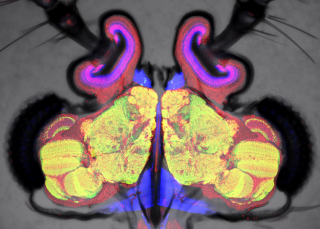Mosquito Molecular Neuroscience Lab

The mosquito ear is one of the most complex sensory organs in insects. In an organ smaller than a pin’s head, it contains around 15,000 sensory neurons, approximately the same number of neurons as hair cells in the human cochlea.
The sense of hearing is essential for mosquito reproduction, as mosquitoes use their highly sophisticated ears to detect the wing beats of mating partners within aerial swarms.
These features of the mosquito auditory system, namely its high complexity and its role in mosquito mating, turns mosquito audition into an interesting field of research both from a fundamental science and a translational research perspective.
In our lab, we try to disentangle the complexities of the mosquito auditory physiology and to apply our findings to develop novel approaches to develop field interventions to control mosquito populations.
Funded by:
 Close
Close



